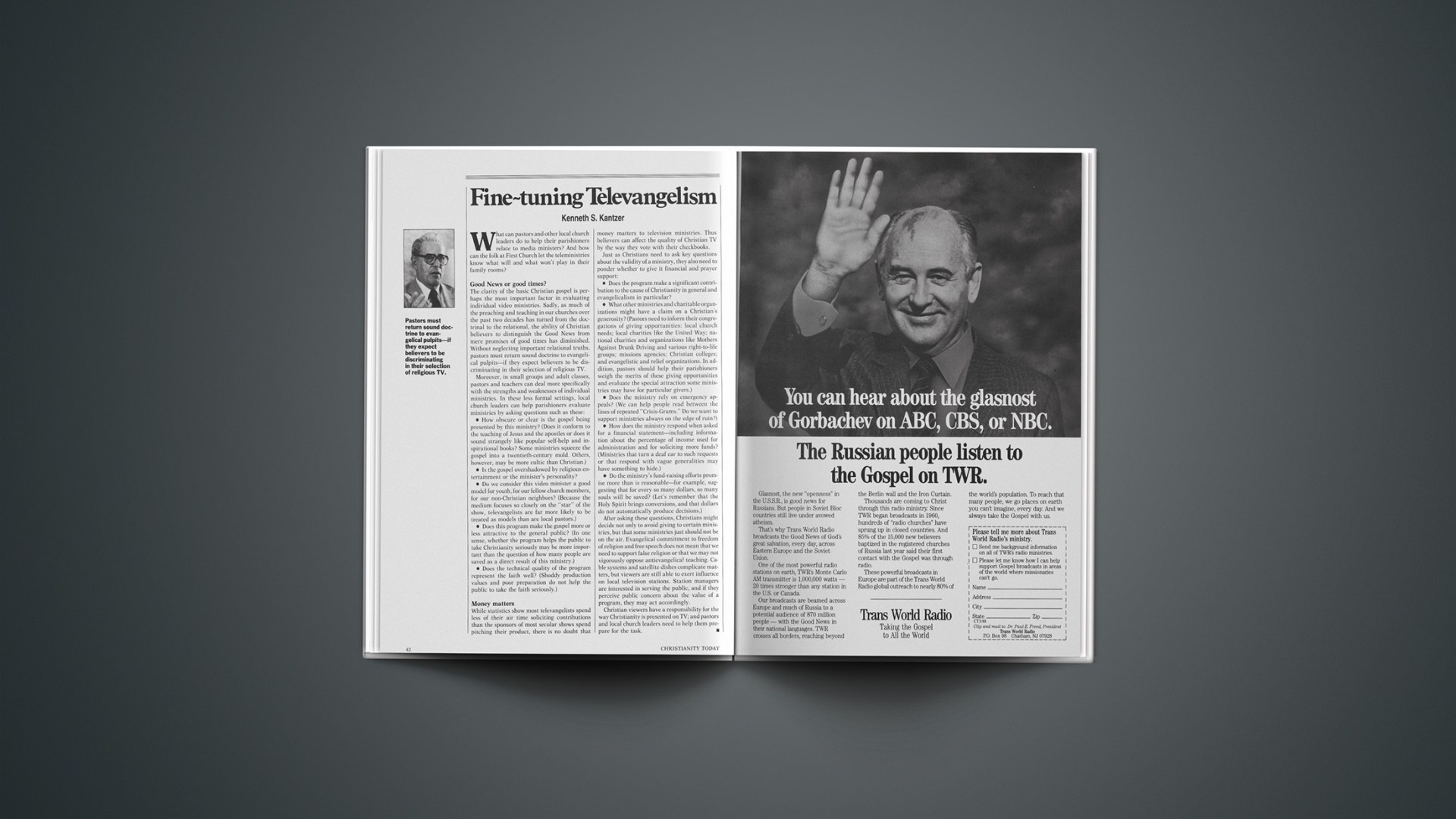What can pastors and other local church leaders do to help their parishioners relate to media ministers? And how can the folk at First Church let the teleministries know what will and what won’t play in their family rooms?
Good News Or Good Times?
The clarity of the basic Christian gospel is perhaps the most important factor in evaluating individual video ministries. Sadly, as much of the preaching and teaching in our churches over the past two decades has turned from the doctrinal to the relational, the ability of Christian believers to distinguish the Good News from mere promises of good times has diminished. Without neglecting important relational truths, pastors must return sound doctrine to evangelical pulpits—if they expect believers to be discriminating in their selection of religious TV.
Moreover, in small groups and adult classes, pastors and teachers can deal more specifically with the strengths and weaknesses of individual ministries. In these less formal settings, local church leaders can help parishioners evaluate ministries by asking questions such as these:
- How obscure or clear is the gospel being presented by this ministry? (Does it conform to the teaching of Jesus and the apostles or does it sound strangely like popular self-help and inspirational books? Some ministries squeeze the gospel into a twentieth-century mold. Others, however, may be more cultic than Christian.)
- Is the gospel overshadowed by religious entertainment or the minister’s personality?
- Do we consider this video minister a good model for youth, for our fellow church members, for our non-Christian neighbors? (Because the medium focuses so closely on the “star” of the show, televangelists are far more likely to be treated as models than are local pastors.)
- Does this program make the gospel more or less attractive to the general public? (In one sense, whether the program helps the public to take Christianity seriously may be more important than the question of how many people are saved as a direct result of this ministry.)
- Does the technical quality of the program represent the faith well? (Shoddy production values and poor preparation do not help the public to take the faith seriously.)
Money Matters
While statistics show most televangelists spend less of their air time soliciting contributions than the sponsors of most secular shows spend pitching their product, there is no doubt that money matters to television ministries. Thus believers can affect the quality of Christian TV by the way they vote with their checkbooks.
Just as Christians need to ask key questions about the validity of a ministry, they also need to ponder whether to give it financial and prayer support:
- Does the program make a significant contribution to the cause of Christianity in general and evangelicalism in particular?
- What other ministries and charitable organizations might have a claim on a Christian’s generosity? (Pastors need to inform their congregations of giving opportunities: local church needs; local charities like the United Way; national charities and organizations like Mothers Against Drunk Driving and various right-to-life groups; missions agencies; Christian colleges; and evangelistic and relief organizations. In addition, pastors should help their parishioners weigh the merits of these giving opportunities and evaluate the special attraction some ministries may have for particular givers.)
- Does the ministry rely on emergency appeals? (We can help people read between the lines of repeated “Crisis-Grams.” Do we want to support ministries always on the edge of ruin?)
- How does the ministry respond when asked for a financial statement—including information about the percentage of income used for administration and for soliciting more funds? (Ministries that turn a deaf ear to such requests or that respond with vague generalities may have something to hide.)
- Do the ministry’s fund-raising efforts promise more than is reasonable—for example, suggesting that for every so many dollars, so many souls will be saved? (Let’s remember that the Holy Spirit brings conversions, and that dollars do not automatically produce decisions.)
After asking these questions, Christians might decide not only to avoid giving to certain ministries, but that some ministries just should not be on the air. Evangelical commitment to freedom of religion and free speech does not mean that we need to support false religion or that we may not vigorously oppose antievangelical teaching. Cable systems and satellite dishes complicate matters, but viewers are still able to exert influence on local television stations. Station managers are interested in serving the public, and if they perceive public concern about the value of a program, they may act accordingly.
Christian viewers have a responsibility for the way Christianity is presented on TV; and pastors and local church leaders need to help them prepare for the task.










